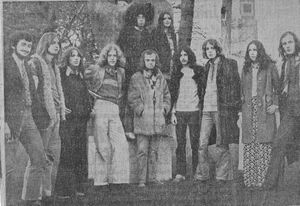
Peel with the Principal Edwards Magic Theatre
By way of being a sort of afterthought. There is a Principal Edward's Magic Theatre. Uncertain in composition and varied in achievement are they and you will hear a great deal more of them. Be prepared..." (John Peel, International Times 35, 12 July 1968, p.6)
Principal Edwards Magic Theatre was a 14-member communal performance art collective in the United Kingdom made up of musicians, poets, dancers, and sound and lighting technicians ... (read more at Wikipedia)
Links to Peel
"It would be nice, perhaps, to talk of Principal Edwards Magic Theater - a large group of gentle people who would seem to represent what is coming in the boundless universe of music. It is not easy to say exactly how many of there are because tonight, or tomorrow, you may be part of Principal Edwards."
(John Peel, Disc & Music Echo, 1969-04-05)
Principal Edwards Magic Theatre were discovered by John Peel while they were a student group at the University of Exeter, and for a time in 1968-69 he rated them very highly. Peel mentioned them on his shows and wrote about them in his columns in International Times and Disc and Music Echo. Describing a live gig by them in issue 53 of International Times (25 March 1969) he wrote:
What they do to the inner Peel is the same as The Misunderstood, Captain Beefheart and Tyrannosaurus Rex have done on other occasions. There is the feeling of a strange warmth that touches all parts of me, feels like cool, soft hair drawn infinitely slowly across the back.......They have equipment problems sometimes but the important thing is that Principal Edwards Magic Theatre IS and that they will, sooner or later, bring some colour into your life. Believe me - and I say that objectively even though I love them all very much - and am still a little afraid of them, too.
He signed them to his Dandelion label, for whom they recorded two albums: Soundtrack, in 1969, and The Asmoto Running Band, in 1971. At a time when Peel was at the height of his popularity and influence, all this might have been expected to lead to success, and they contributed a centre-page feature to issue 40 of International Times ("Thank you, John Peel, for everything") - yet Principal Edwards never gained much acclaim, either critically or commercially. This was in part due to their anti-commercial ethos - they lived communally in typical hippie style - but also because, minus the trappings which enhanced their live performances, their music was an uneasy mixture of Elizabethan-influenced folk and mediocre psychedelic rock, with few memorable songs. Peel found it hard to convince others of their quality. His Top Gear producer John Walters was unimpressed, as he told John Tobler in Zigzag 24 (1972):
"We even used Principal Edwards twice, although I would never use them again as things stand. I used them the first time because I could see why John had taken an interest, in that they were unusual; it was a mixed media group, and at that time it seemed a good idea to explore it as an avenue that might happen...a big group, incorporating all kinds of arty-farty nonsense. I was pretty disappointed by the session - I didn't feel it really had anything, so it was a good eighteen months or more before I booked them again, on the grounds that they had supposedly got themselves together. I found that the instrumental side had improved, but the pretentious side had become, if anything, worse, to my mind - although it's obviously a personal thing"
In Margrave Of The Marshes (pp.195-96), Sheila Ravenscroft mentioned that she and Peel had had Principal Edwards stay with them at their London Peel Acres, but had been annoyed at the large group's taking advantage of their hospitality and offering little in return ("They were rarefied rock stars. They were above such things as laundry"). Later he regarded his involvement with the group as an error of judgement and never returned to their records, which - unlike much of the material of the Top Gear era - have not worn well, and only seem to be valued by a few collectors.
Festive Fifty Entries
- None
Sessions
Five sessions. Three tracks from #2 and two from #3 are included in The Works 1969-1971 (Cherry Red CDTRED704).
1. Recorded: 1968-07-16. First broadcast: 31 July 1968. Repeated:
- 1st Day Of Spring / Motel Song / Buckle My Knee / Hey Joe / To A Broken Guitar
2. Recorded: 1969-02-24. First broadcast: 30 March 1969. Repeated: 27 April 1969.
- Lament For The Earth / The Ballad Of The Big Girl Now And The Mere Boy / Third Sonnet To Sundry Notes Of Music / Pinky: A Mystery Cycle
3. Recorded: 1970-01-13. First broadcast: 17 January 1970. Repeated:
- Thus Making A Change / Autumn Lady Travelling Song / Plague Of Birds / King Of The Ensor
4. Recorded: 1971-03-23. First broadcast: 10 April 1971. Repeated:
- Kettering Song / Weasei / Freephall
5. Recorded: 1973-09-17. First broadcast: 18 October 1973. Repeated:
- Juggernaut / Milk And Honey Land
(Please correct mistakes and add any missing info)
Other Shows Played
- 06 December 1969: Enigmatic Insomniac Machine (LP - Soundtrack) Dandelion
- 20 December 1969: Sacrifice (LP - Soundtrack) Dandelion
- 10 January 1970: Third Sonnet to Sundry Notes of Music (LP: Soundtrack) Dandelion
- 31 May 1973: Captain Lifeboy (single) Deram (as Principal Edwards)
- 26 October 1999: (After mentioning that Appliance come from Exeter, John recalls (with not a little distaste) that the Principal Edwards Magic Theatre also hailed from there, and the mere mention of their name at Peel Acres provokes 'an emotional crisis.')